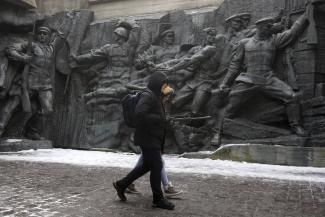
In speeches leading up to Russia’s invasion of Ukraine, Russian President Vladimir Putin made a number of historical assertions about Ukraine, everything from the country having no right to exist to claiming his troops must “de-Nazify” Ukraine and prevent genocide.
Why has Putin been harkening back to World War II, in particular referencing the Holocaust and Nazism, at this point in time? What can history tell us about what is happening in Ukraine?
Penn Today spoke with historian Benjamin Nathans, who teaches and writes about Imperial Russia, the Soviet Union and modern European Jewish history, to get some background on Putin’s use of history in justifying the war.
What do you make of the comparisons made between Putin’s invasion of Ukraine and Hitler’s 1939 invasion of Czechoslovakia and Poland?
It’s true that Putin is using the argument that he’s protecting the rights of ethnic Russians in Ukraine in a way that is similar to Hitler’s claim that he was protecting the rights of ethnic Germans in Eastern Europe, whether that was in the territory known as the Sudetenland in Czechoslovakia or in Poland.
There’s also a parallel in the sense that Hitler came to power in a Germany that had been humiliated by its defeat in the First World War and lost a lot of territory in the peace settlement that ended that war. The Soviet Union didn’t lose a hot war, but it lost the Cold War, and it lost significant territory that had been part of the Soviet Union and before that the Russian Empire.
There’s a similar sense of grievance, of national humiliation and being unable to change the results of the Cold War. I think Putin is motivated by that and is drawing on that, although it’s still unclear how much of the Russian population shares those feelings.
Why is Putin talking so much about the past?
Vladimir Putin himself is quite obsessed with history. So part of our attention to this should be looking at how Putin is using history. What is he drawing on in terms of his own motives? But just as important is the way he’s telling the story to the Russian population.
This is where things get very interesting and very disturbing. There is no grander moment in Russia’s modern history than 1945. That is the absolute high point of Russian pride and achievement and sense of mission and purpose and greatness. Because Russia alone among European powers not only withstood the Nazi onslaught—the largest and most lethal military attack ever waged in history, Operation Barbarossa launched in June of 1941 by Hitler—and withstood that attack at a price that Americans can barely imagine, it also turned the tide and crushed Nazi Germany. The Soviet Union deserves more credit than any other single country, including the United States, for the defeat of Nazis, for the defeat of what by many people’s reckoning is the closest we’ll ever get to absolute evil.
This victory over Nazism has penetrated the psyche of Russians like nothing else. There’s so much in Russia’s 20th-century history that is catastrophic and shameful, and produced horrifying results for Russians themselves, like the Bolshevik Revolution and Stalinism. The defeat of Nazi Germany is sacred ground for Russia. Putin, long before troubles with Ukraine started, has been making the defeat of Nazi Germany the cornerstone of Russian identity. I should also point out that Putin’s older brother died as a toddler during the Nazi siege of Leningrad.
Read the entire interview HERE
